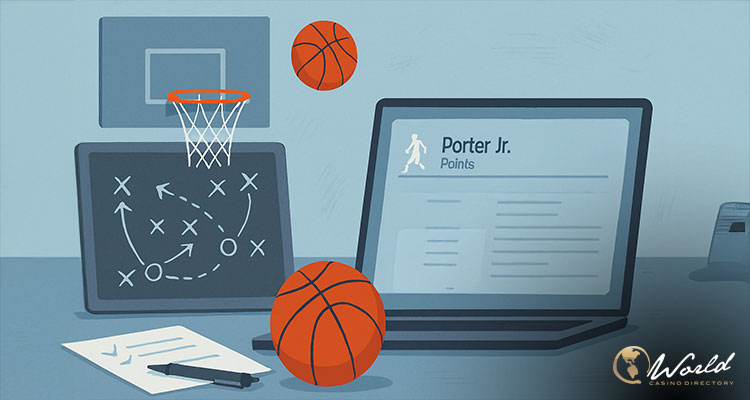Michael Porter Jr. has become the first active NBA player to openly explain just how simple it could be to manipulate sports betting markets, specifically wagers tied to individual player statistics. The Denver Nuggets forward, whose brother Jontay Porter was banned for life from the league in 2024 for a betting-related scandal, shared his perspective during an appearance on the One Night with Steiny podcast.
He painted a hypothetical that, while clearly stated as not something he would personally do, highlights the potential vulnerability of player-specific bets.
“Think about it, if you can get all your homies rich by telling them ‘yo, bet $10,000 on my under — this one game imma act like I got an injury and imma sit out, imma come out after three minutes’ and they all get a little bag because you did it one game,” Porter said, according to Legal Sports Report.
“That is so not okay, but some people probably think like that. They come from nothing and all their homies have nothing and they’re like ‘bro if I come out of this game after three minutes and y’all all hit on my under, we’re all getting a little bag,’ you know what I mean?”
A Scandal That Hit Close to Home
Porter’s awareness of the issue comes from personal experience. Jontay Porter’s lifetime NBA ban followed an investigation that uncovered he had shared confidential health details with bettors and deliberately left games early to affect prop bets. Court records showed that sportsbooks and integrity monitoring groups detected suspicious betting patterns tied to his performance.
According to prosecutors, those wagers were placed by individuals to whom Jontay Porter owed gambling debts. He ultimately pleaded guilty to conspiracy to commit wire fraud, with sentencing recommendations calling for up to four years in prison.
These revelations have placed the NBA under growing scrutiny. The league is also examining cases involving Malik Beasley and Terry Rozier. Federal investigators have connected Beasley to betting on games and making prop bets, while Rozier has been linked to an investigation in which both league and federal officials say he played no illegal role.
“Obviously my brother went through his situation, Malik Beasley’s going through a situation right now, Terry Rozier was in some hot water,” Porter said. “But the whole sports gambling entity, it’s bad and it’s only going to get worse.”
The Rise—and Risks—of Player Props
Since the Supreme Court struck down the Professional and Amateur Sports Protection Act in 2018, legal sports betting has expanded rapidly, creating a market worth nearly $148 billion in 2024. A significant part of this surge is tied to player prop bets, which allow fans to wager on individual performances rather than game outcomes.
For many sportsbooks, player props account for nearly half of all wagers, often driving high-margin parlays and same-game parlays that can represent more than 60% of total bets in some states. While these wagers have fueled industry profits, they’ve also increased opportunities for manipulation.
Porter highlighted that in prop betting, the player controls the outcome entirely. Whether a forward grabs a set number of rebounds or scores a target number of points can be decided by their own actions on the court, making the temptation for unethical influence a concern—particularly for athletes who “come from nothing” and might see an opportunity to help friends and family profit.
Calls for Regulation vs. Industry Pushback
In Ohio, regulators are working to eliminate player-specific micro markets after Governor Mike DeWine urged a full ban on player props in professional sports. The move follows two separate investigations involving Cleveland Guardians players accused of similar misconduct. DeWine has signaled his intent to press major sports leagues and unions to support a nationwide ban.
Industry leaders, however, caution against outright prohibition. The American Gaming Association argues that legal markets allow suspicious activity to be identified and stopped. “Prohibition doesn’t stop betting — it stops oversight,” a spokesperson said, warning that illegal operators would not cooperate with leagues or protect athletes and fans.
Porter’s remarks point to a fundamental tension in modern professional sports: the pursuit of lucrative betting partnerships versus the risk of undermining game integrity. While sportsbooks, leagues, and regulators debate where to draw the line, players remain under pressure from both the expectations of bettors and the potential for criminal exploitation.
As Porter put it, even strong performances can make enemies. “The crazy part is you can’t win anymore, because if I do too good I’m messing up the people that bet on the under, and if you bet on the over — you know what I’m saying? You’re messing up some people’s money.”
For now, his candid warning serves as a rare public acknowledgment from within the league of a problem that shows no signs of fading.


